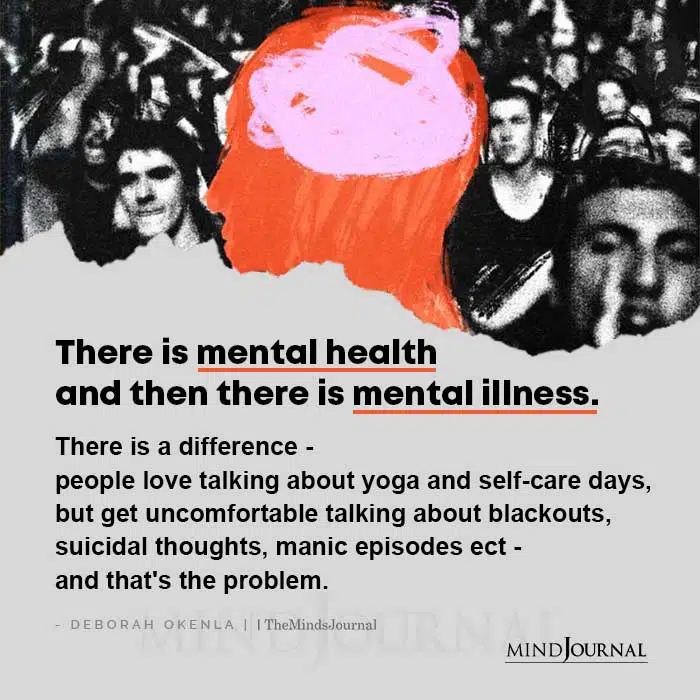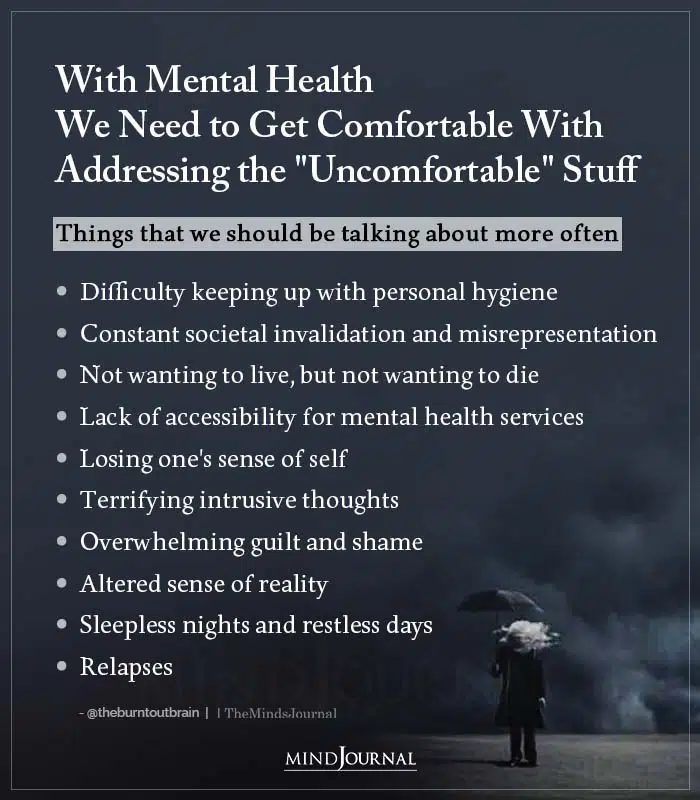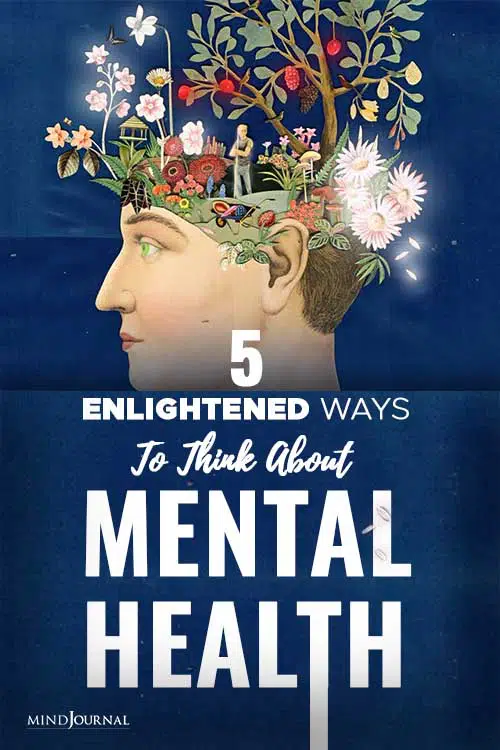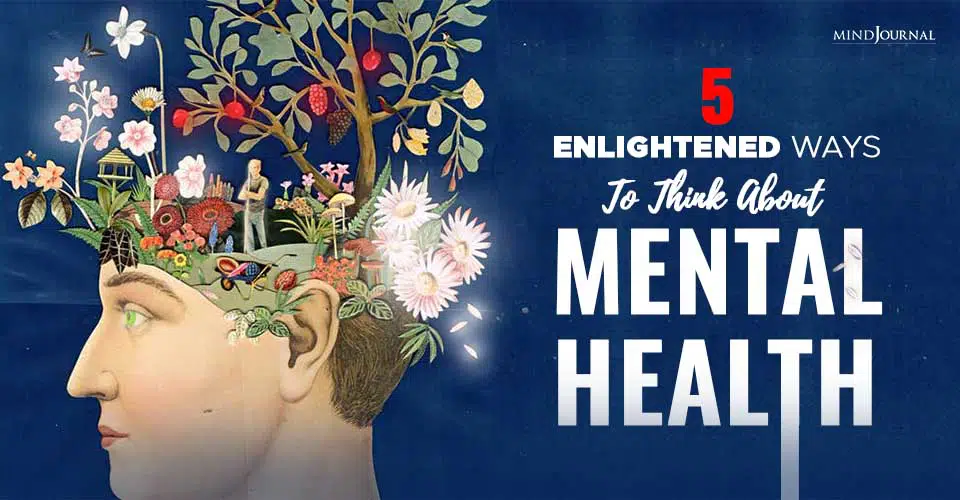Five Enlightened Ways To Think About Mental Health.
It’s time to eradicate stigmas.
Written by: Hilary Jacobs Hendel, LCSW, author of It’s Not Always Depression
Life is hard even under the best of circumstances. Without physical and mental health, it’s difficult to enjoy life and to thrive. It makes good sense to take care of ourselves and that includes getting help when we suffer physically or psychologically.
When we feel sick we get ourselves to the doctor. And when we feel so bad that we think about hurting ourselves or others, or when we cannot engage positively in work or in relationships, or we cannot accomplish what we want, we should seek help to feel better. That is what all of us deserve.
Mental health shouldn’t be a dirty word. Still damaging stigmas prevail allowing ignorance to end lives. Judging others or ourselves for our suffering is just plain harsh, not to mention counterproductive. When was the last time telling a depressed person to “get over it” worked? Try never! And using shame as a tactic to “encourage” someone to be what you think they should be only added to a person’s suffering.

Mental health problems should be thought of no differently than physical health problems. In fact, they have completely related: mental health problems affect physical health and physical health problems affect mental health. We need a world where no one feels embarrassed or ashamed about their suffering. We need a world where suffering evokes only kindness, compassion, and a desire to help.
Here are 5 enlightened ways to think about mental health:
1. Everyone suffers.
I have never met anyone who is happy and calm all the time. It’s just not possible, no matter how good someone’s life looks from the outside. Most people suffer at some point in their life from anxiety, depression, aggression, PTSD, shame, substance abuse disorders, and other symptoms.
And, if a person is lucky enough to never suffer psychologically, they surely love someone who does suffer in these ways. Instead of living lives of quiet desperation, to paraphrase Henry David Thoreau, let’s encourage honest talk. If someone gets uncomfortable with honest talk, we can talk about that too.
2. Mental health checkups are an important part of wellness.
Do you feel ashamed when you go for a check-up at your internist? Probably not. On the contrary, you’re likely to feel proud that you are taking care of your health. Yet most people are ashamed to call a psychotherapist for a consultation.
This makes no logical sense. A mental health checkup is a great idea especially if you are suffering and not able to function the way you want. You should feel very proud for taking care of your mental health.
Also, read 11 Signs You Need To Talk To A Therapist
3. Gym for the brain.
That’s exactly how I describe therapy for my patients who come in feeling bad that they “have to come to therapy.” In our society, we praise people for working out at the gym. We think of them as maintaining their health and taking good care of themselves. Well, that’s no different for a person wanting to enhance their psychological wellbeing.
Therapy grows new brain cell networks, calms the mind and body, makes it easier to meet life’s challenges, and helps us thrive as we become the best versions of ourselves that we can.
Also, read 22 Tips To Keep Your Brain Sharp and Young At Any Age
4. Education in emotions is a game-changer.
We live in a challenging society because it is not very nurturing. That’s why rates of anxiety, depression, and substance abuse disorder have skyrocketed. According to a new disturbing report from the CDC, suicide rates are steadily increasing.
At the very least, our society could provide accessible and understandable education on emotions. This would help us all understand how our childhood experiences translate to directly affect our adult mental health (for better and for worse).
Emotion education debunks myths like “emotions are just for weak people” and we can control our suffering with “mind over matter.” Our schools should be teaching us trauma-informed tools like the Change Triangle.
Our educational institutions should be teaching skills for managing relationships and interpersonal conflicts constructively so bullying, for example, would become a thing of the past.
Parents should be taught about emotions so they don’t unwittingly create shame and anxiety in their children. Education on emotions and how emotions affect the brain, body, and mind depending on how we work with them, has great power to change society for the better and even reverse the current epidemic in depression, anxiety, and addictions.
5. Question assumptions, judgments, and fears around mental health and mental illness.
Many of us fear difference. When people feel, act or look different than we do, we tend to judge them. Judgment, while a form of misguided emotional protection achieved by distancing ourselves from those we fear or don’t understand, is destructive for all of us. Judgment is the basis of stigma and justifies the horrible way we treat people who suffer from mental illnesses and substance abuse disorders.

Also read How To Deal With Heightened Emotions When You Are An Empath? 5 Tips
Judgment shames those who suffer, and that is all of us. No wonder shame-based depressions are rampant in our society. Instead of judging others for emotions and suffering, can we instead be curious about our assumptions and question where we learned to judge or fear people who struggle psychologically?
Most suffering can be eased with support, proper treatment, and a variety of resources. Let’s be proud to grow our collective and individual mental health. What a difference it makes to wholeheartedly say to someone seeking help, “Good for you! I could use some help for myself too!” Because we all can.
Originally appeared on: Psychology Today Republished with permission









Leave a Reply
You must be logged in to post a comment.